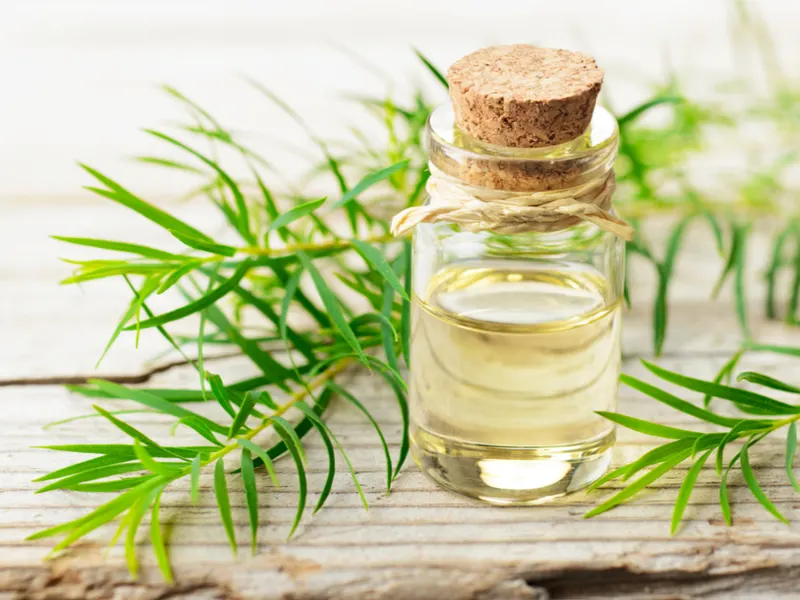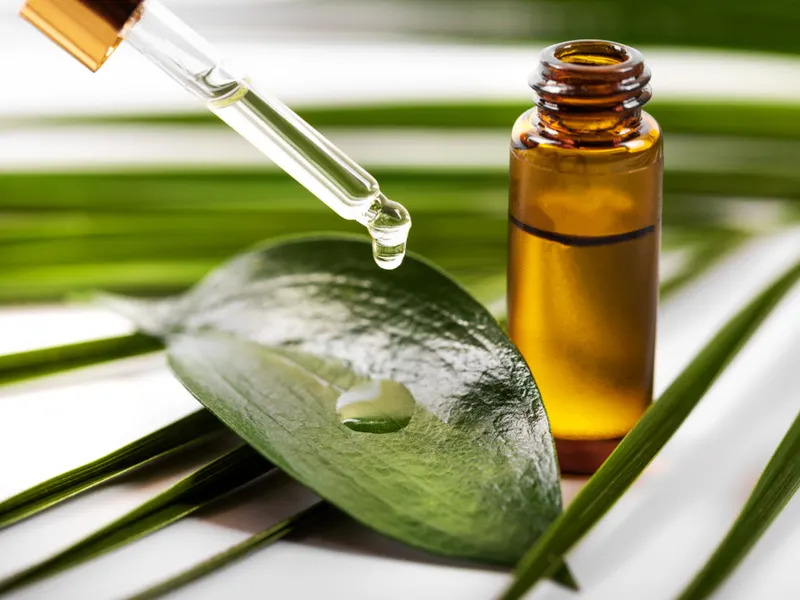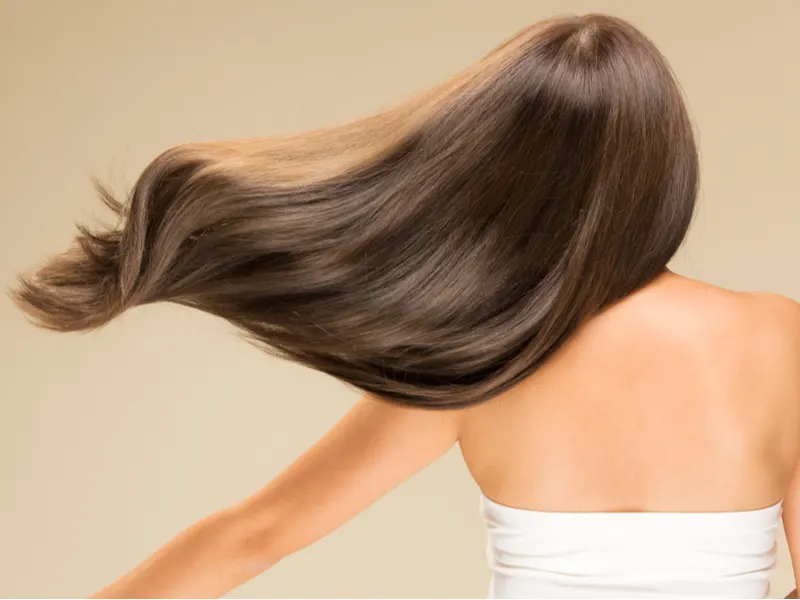Jump to:
If you’ve heard that tea tree oil can improve hair health, you’re absolutely right–but you’re probably wondering how much tea tree oil to add to shampoo. We’ll cover everything you need to know about incorporating this amazing oil into your routine.
What Is Tea Tree Oil?

AmyLv/Shutterstock
Tea tree oil comes from a tea tree native to Australia and New Zealand. It has antifungal, antibacterial, anti-inflammatory, and antiviral benefits that people have taken advantage of for thousands of years.
Tea tree oil remains popular today, and one of its most common uses is as a natural remedy for hair and scalp issues. You’ve probably already noticed that plenty of hair care products include tea tree oil in their formulations.
But going the extra mile and making your own treatments may be a more effective way to use it. If you’re considering using tea tree oil, you probably have some questions about it, like:
- What are the benefits of using tea tree oil?
- How to use it and how much to add to shampoo
- If there are any other ways to use tea tree oil
We want everyone to reap the benefits of this incredible oil, so we made it our mission to answer these questions and more. Keep reading to discover everything you need to know.
Read Next: Finding the Best Tea Tree Shampoo for Your Hair
The Benefits of Tea Tree Oil for Hair
First things first: what’s all the fuss about? Why should you use tea tree oil on your hair anyway? Well, all the hype is well-deserved. Here are a few ways your scalp and locks can benefit from using tea tree oil.
Tea Tree Oil Treats Dandruff
No one likes seeing the unsightly dry flakes characteristic of dandruff on their clothing and scalp. Unfortunately, treating the condition usually involves smelly shampoos that are anything but luxurious.
If you’re experiencing dandruff but want a natural remedy, tea tree oil is worth a shot.
Because of its antifungal properties, tea tree oil is excellent at treating dandruff. It’s also an effective cleanser, as it’s excellent at removing dandruff-causing dead skin cells and buildup.
Tea Tree Oil Relieves Itchy Dry Scalp
Seborrheic dermatitis is a condition causing scaly patches on the scalp. These scaly patches can become pretty itchy and uncomfortable, but tea tree oil can help relieve the symptoms. It functions as a natural scalp conditioner and gets rid of flake-causing agents.
Tea Tree Oil Promotes Hair Growth
Using this essential oil on your hair nourishes both the roots and hair follicles for stronger, thicker hair. And because it prevents excess oil production, blood flow improves and nutrients are better able to reach the hair follicles.
The result? Increased stimulation in the hair growth cycle–in other words, longer, healthier-looking locks.
Tea Tree Oil Gets Rid of Lice
Chances are tea tree oil isn’t the first product that comes to mind if you’re dealing with lice, but think again–you may actually want to reach for your bottle.
Further research on the efficacy of tea tree oil in treating lice is needed, but early results are promising. They’ve shown that it has insecticidal effects, specifically the ability to kill lice as both nymphs and adults.
What’s even more interesting is that tea tree oil can prevent lice eggs from hatching. So if you’re looking for an all-natural alternative to harsh chemical treatments, a bottle of your favorite tea tree oil may be the best solution.
How Much Tea Tree Oil to Add to Shampoo

Ronstik/Shutterstock
Ok, so now that you know the benefits of tea tree oil, it’s time to talk about how to add it to your shampooing regimen. One of the most critical things is to make sure you’re using essential oil and not fragrance oil.
Fragrance oils in shampoo don’t have the same health benefits, so while they smell good, you won’t get the same results.
Once you’re sure you have the right product, it’s time to test it out.
- When you first use tea tree oil, it’s best to start out conservative as it can cause irritation in some people.
- Mix shampoo in the palm of your hand with two or three drops of tea tree oil, and let it sit on your scalp for five minutes.
- Make sure to rinse it out thoroughly.
Once you’ve tried this treatment a few times and have determined that it’s not causing any adverse effects, you can add the tea tree oil directly to your shampoo bottle.
A good rule of thumb is to add eight to ten drops of tea tree oil for every 250 ml of shampoo.
Other Ways You Can Use Tea Tree Oil
Putting tea tree oil in your shampoo is just one of a handful of ways to use it. Here are some other ideas for incorporating tea tree oil into your hair care routine.
- Add it to your favorite deep conditioner. Hair masks are an ideal place to add tea tree oil, which will help give your deep conditioning session a one-two punch: treatment for dryness and dandruff all in one.
- Develop a scalp massage oil. After you wash and condition your hair, it’s an excellent moment to try a tea tree oil scalp massage. Add two or three drops to a carrier oil (coconut oil works well) and massage the mixture into your damp scalp. Massaging the scalp encourages blood flow, and this leave-in treatment will condition the area as well.
- Look for products with tea tree oil. It can be easy to go overboard and find yourself mixing a too-strong concoction that irritates your scalp. If the treatment is too much for you, you can still take advantage of the benefits of tea tree oil by looking for products formulated with it. This way, you can be sure not to overdo it.
Frequently Asked Questions

kei907/Shutterstock
Yes, tea tree oil is safe for any hair type or texture. Just be aware that it may cause an allergic reaction or contact dermatitis in individuals with skin sensitivities. Because it’s a concentrated essence, it’s best not to use tea tree oil undiluted. Always mix it with a carrier fluid like shampoo or lotion. Tea tree oil is a natural remedy for things like acne, sinusitis, and athlete’s foot. It also helps treat bacterial and viral infections. Pregnant or breastfeeding people should proceed with caution before using tea tree oil. It’s best to consult your doctor before trying it. Tea tree oil is meant for topical use only and should not be ingested. Ingesting the oil can have serious consequences, like loss of balance and muscle control, and it could even put you in a coma.Can all hair types use tea tree oil?
Do I have to mix tea tree oil with a carrier fluid?
What other health benefits does tea tree oil have?
Is tea tree oil safe to use in pregnancy/while breastfeeding?
Is tea tree oil safe to ingest?
So, How Much Tea Tree Oil Do You Add to Shampoo?
Now you know all about the amazing benefits of tea tree oil and how easy it is to use–just make sure to patch test it first to avoid any irritation. Add a few drops to your shampoo, and you’re good to go.
